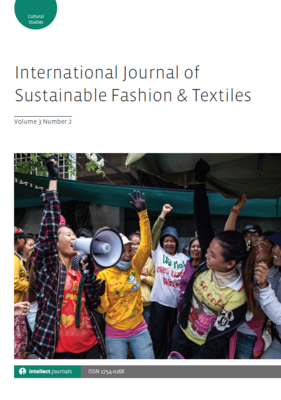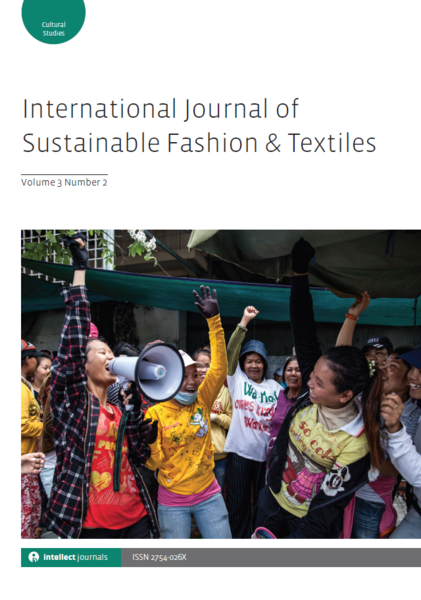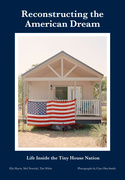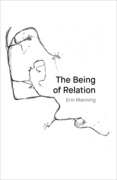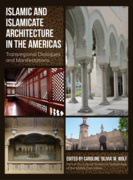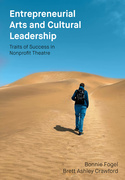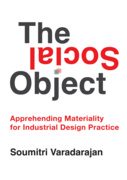General Call for Papers
The International Journal of Sustainable Fashion & Textiles (SFT) is a peer-reviewed academic publication and the world’s first ongoing subscription journal dedicated to the area of sustainability and ethics in the fashion and textiles industry. Its principal objectives are to provide a platform for the advancement of sustainable fashion and textiles innovation, raise awareness of the environmental and social issues and disseminate how sustainable solutions can be implemented. The journal aims to approach the broad subject of sustainability from both an academic and industry perspective, inviting stakeholders from all areas of the fashion and textile industry to submit innovative research which will inform future sustainable developments. The subject is approached from a range of perspectives, publishing a variety of conceptual, theoretical and practice-based work from around the world. The journal encourages interdisciplinary research that crosses – and indeed challenges – the boundaries between the humanities and the social sciences, in an aim to unite and enlarge an increasingly global community of researchers and practitioners working in this extremely topical area.
Submissions are invited from both industry professionals and academics on all aspects of ethical and sustainable fashion and textiles which address the key themes of sustainable materials, design, ethical production, distribution, retail and consumption, and education.
Contributions are welcomed on all aspects of social, environmental and economic sustainability in fashion and textiles. Topics include, but are not limited to:
- Sustainable design
- Low waste production
- Ethical manufacturing
- Circular economy initiatives
- Social and environmental innovation including textiles, clothing and accessories
- Supply chain and LCA in relation to ethics and sustainability
- Sustainable materials
- Consumer behaviour in relation to ethics and sustainability
- Social innovation
- Education: Reframing pedagogical approaches to sustainability
- Responsible advertising and cause-related marketing / branding
- Textile recycling initiatives
- Sustainable fashion practices such as recycling, upcycling, remanufacture
- Textile cycle of manufacture, circulation, consumption and disposal
- Fashion and textile impact on the world’s natural assets, resources and environments
SFT invites contributions of the following:
Research Articles: 6000–8000 words
Book/Event/Conference/Exhibition Reviews: 1000–2000 words
Interviews: 1500–2000 words
Industry Reports: 5000 words maximum
Case Studies: 1500–2000
Submission guidelines
Please submit via the link on the journal homepage.
All submissions must follow Intellect’s house style. It is the author’s responsibility to clear the usage rights for all images to be published in the manuscript.
Special Issue Call for Papers
‘Use for Longer: Opportunities and Barriers to Extending the Clothing Lifetimes’
Special Issue editors:
Kirsi Niinimäki, Aalto University, Finland, kirsi.niinimaki@aalto.fi
Claudia E. Henninger, University of Manchester, UK, Claudia.henninger@manchester.ac.uk
Submissions are invited from both industry professionals and academics on all aspects of ethical and sustainable fashion and textiles which address the key themes of the Special Issue call for papers.
The fashion and textile industry has been reported to cause the ‘fourth highest pressure on the environment and climate, following consumption of food, housing and mobility’ (EEA 2024). One of the reasons for such high ranking is fashion’s waste problem, accelerated and fostered by low-cost (ultra) fast and now instant fashion sales, which reduce the perceived value of clothing and normalize the mindset of disposability.
While fashion’s waste issue is not new – the 2011 Waste Hierarchy illustrates that waste can be minimized through prioritizing reduced acquisition of new items and reuse, before moving into recycling, recovery of materials and the ultimate disposal – the problem is persistent. To support the reuse aspect, a WRAP (2017) report outlined that actively using our garments for an additional nine months can reduce the carbon, water and waste footprint by between 20–30%, given that we reduce the acquisition of new clothing accordingly. Yet, a decade later, the fashion and textile industry seems to still be stagnating with questions being raised on how to design for longer product lifespans and reuse.
This Special Issue seeks conceptual and empirical contributions that focus on the following areas:
- Physical durability – how can the industry shift away from the (ultra) fast fashion model that produces high volumes of low-cost garments with high environmental and social costs, while retaining a viable long-term business? Between 50–75% of the garments we dispose of are not worn out (Köhler et al. 2021; van Duijn et al. 2022). When does increasing physical durability prolong the lifespans, and are there situations when it can be counterproductive, for example, due to increased material use? The focus here is on design attributes and also technical aspects.
- Emotional durability – what can we learn from empirical evidence on long-term use of clothing? Are there ways to foster emotional durability of garments through decisions at the design stage? What best practice examples are in place to showcase design attributes that enhance emotional durability? What practical steps can users/designers/manufacturers of clothing and/or (fashion) journalists take to support the mindset of emotional durability?
- Garments intrinsic and extrinsic properties – what may aspects such as warranty rights, repairability, price as well as other items in the wardrobe play in order to foster longevity?
- Methodologies – how can use practices be explored and investigated through research and design practice? How can garment lifetimes be more accurately assessed through quantitative and qualitative methods? Are there new, previously unexplored parameters, that need to be brought into the understanding of clothing longevity?
This list is not exhaustive. We welcome contributions on other topics connected to sustainability and durability.
SFT invites contributions of the following:
- Research Articles: 6000–8000 words
- Industry Reports: 5000 words maximum
- Case Studies: 1500–2000 words
Submission guidelines
Please submit via the submit button on the journal’s homepage: https://www.intellectbooks.com/international-journal-of-sustainable-fashion-textiles.
All submissions must follow Intellect’s house style: www.intellectbooks.com/journal-editors-and-contributors. It is the author’s responsibility to clear the usage rights for all images to be published in the manuscript.
- Full papers to be submitted by 30 November 2025
- Peer review process to be completed by 31 March 2026
- Final paper deadline (if accepted): 31 July 2026
- Issue publication: November 2026
References
DEFRA (2011), ‘Guidance on applying the waste hierarchy’, DEFRA, June, https://assets.publishing.service.gov.uk/media/5a795abde5274a2acd18c223/pb13530-waste-hierarchy-guidance.pdf. Accessed 25 September 2024.
Van Duijn, H, Carrone, N. P., Bakowska, O., Huang, Q., Akerboom, M., Rademan, K. and Vellanki, D. (2022), ‘Sorting for circularity Europe: An evaluation and commercial assessment of textile waste across Europe’, Fashion for Good, September, https://reports.fashionforgood.com/report/sorting-for-circularity-europe/. Accessed 25 September 2024.
EEA (2024), ‘Textiles’, EEA, 17 September, https://www.eea.europa.eu/en/topics/in-depth/textiles#:~:text=Our%20assessments%20show%20that%2C%20compared,materials%20and%20greenhouse%20gas%20emissions. Accessed 25 September 2024.
Köhler, A., Watson, D., Trzepacz, S., Löw, C., Liu, R., Danneck, J., Konstantas, A., Donatello, S. and Faraca, G. (2021), Circular Economy Perspectives in the EU Textile Sector, EUR 30734 EN, Luxembourg: Publications Office of the European Union, https://publications.jrc.ec.europa.eu/repository/handle/JRC125110. Accessed 25 September 2024.
WRAP (2017), ‘Valuing our clothes: The cost of UK fashion’ WRAP, 17 July, https://wrap.org.uk/resources/report/valuing-our-clothes-cost-uk-fashion. Accessed 25 September 2024.
‘Re-Imagining Fashion Retailing and Marketing in the Epoch of Sustainability and Digitalization’
Special Issue Editors:
Bethan Alexander, Fashion Business School, London College of Fashion, University of the Arts, London, b.alexander@fashion.arts.ac.uk
Professor Natascha Radclyffe-Thomas, Ravensbourne University London, n.radclyffe-thomas@rave.ac.uk
To view the full call access the PDF above entitled Call for Papers: ‘Re-Imagining Fashion Retailing and Marketing in the Epoch of Sustainability and Digitalization’.
Submissions are invited from both industry professionals and academics on all aspects of ethical and sustainable fashion and textiles which address the key themes of the Special Issue call for papers.
Through this Special Issue, we call for scholars to challenge the current fashion system and to reimagine ways in which sustainability, technology and their interplay, shape design, retailing and marketing. We are interested in practical, empirical and conceptual papers, especially those that advance our understanding of these two areas within retail store design, consumption and buying behaviours, retail formats, channels, services, customer experience, marketing communications, collaborations, activations and retailer reputation.
For this Special Issue, we welcome contributions on topics including:
- green, sustainable, ethical and pro-environmental fashion consumption
- consumption across physical and digital retail channels
- ethical considerations in retailing and marketing
- consumer behaviour in relation to ethics and sustainability
- social sustainability within design, retailing and marketing
- circular economy informing store design, retailing and marketing
- immersive and predictive digital technologies, e.g., AI, virtual/augmented realities etc. and/or their interplay for advancing sustainability
- experience design, such as new store formats and digital shopping experience, impacting customer experience and value creation
- social media, communities and platform-mediated algorithms
- sustainable innovation and green technologies
- sustainable fashion marketing communications
- sustainability and retail store design, on and offline
- sustainability practices and retailer reputation
- sustainable development, net zero and implications for fashion marketing and retailing
- experience economy evolution through sustainability and technology
- retailing and marketing transformation in the era of sustainability and technology
- conceptual advancements informing design, retail and marketing related to fashion sustainability, technology and their confluence
This list is not exhaustive. We welcome contributions on other topics connected to sustainability and technology and their confluence in shaping design, retail and marketing in a fashion context.
SFT invites contributions of the following:
- Research Articles: 6000–8000 words
- Industry Reports: 5000 words maximum
- Case Studies: 1500–2000 words
Submission guidelines
Please submit via the submit button above.
All submissions must follow Intellect’s house style: www.intellectbooks.com/journal-editors-and-contributors. It is the author’s responsibility to clear the usage rights for all images to be published in the manuscript.
Deadline for issue 5.1:
- Full papers to be submitted by 1 May 2025
- Peer review process to be completed by 30 September 2025
- Final paper deadline (if accepted): 30 January 2026
- Issue publication 30 April 2026

